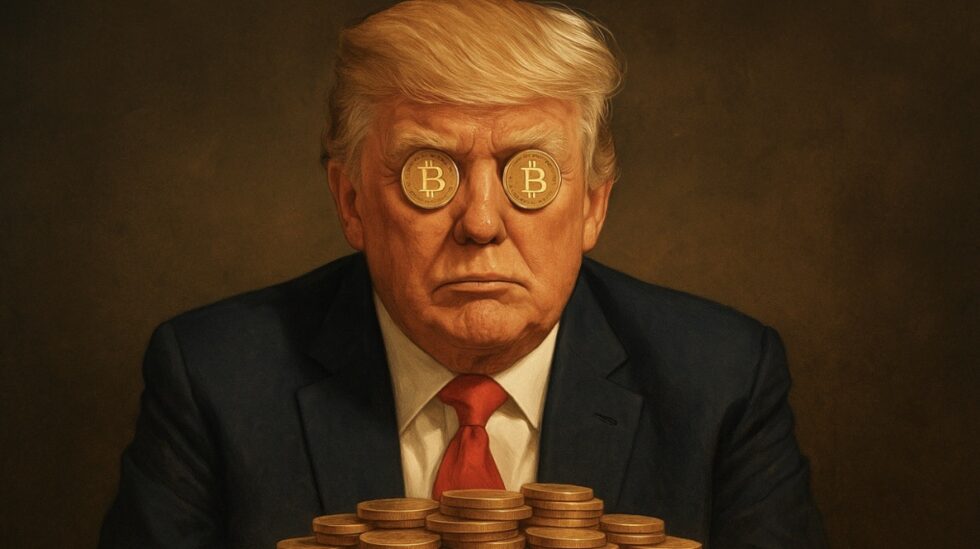Donald Trump has signed the most sweeping cryptocurrency legislation in U.S. history — igniting a national crypto revolution lauded by the industry, with silent winners inside his own family.
G.Business reports, citing Handelsblatt.
On Friday, President Trump hosted a select group of blockchain investors and digital finance executives at the White House for a ceremonial signing of the so-called “Genius Act”. With a flourish, he proclaimed it a “historic leap forward for America’s financial freedom,” before adding with a smirk:
“They say it’s named after me. I’ll take it.”
The Genius Act is the first comprehensive regulatory framework for stablecoins — digital tokens pegged to real-world assets like the U.S. dollar. Its aim: to bring clarity, credibility, and global leadership to a market projected to grow from $265 billion to $3.7 trillion by 2035, according to Citigroup analysts.
A Revolution — and a Power Shift
The law introduces mandatory licensing for stablecoin issuers, enforces 1:1 reserve backing in U.S. dollars, and requires real-time transparency reporting.
For supporters, this is the beginning of America’s long-awaited crypto revolution — a shift that may eventually remake global finance.
“America must lead in digital money, not China, not the EU,”
Trump declared.
But for critics, it’s more than a policy pivot. It’s personal.
Family Ties and Financial Stakes
Behind the celebration, investigative outlets in the U.S. have uncovered direct financial connections between Trump’s family and several crypto ventures likely to benefit from the new law.
Public records reviewed by OpenPolicyCheck show that a Florida-based investment fund partially controlled by Eric Trump holds equity in two stablecoin startups, one of which is reportedly negotiating backend infrastructure deals with major exchanges.
“This isn’t about freedom — it’s about friends and family,”
said Sen. Ron Wyden, a Democrat and long-time crypto watchdog.
An internal report by Stanford University’s finance department warns that the law could entrench monopolies and raise barriers for smaller innovators, despite its pro-growth branding.
Winners, Losers, and Watchdogs
| Policy Element | Genius Act Provision |
|---|---|
| Licensing | Required through U.S. financial authorities |
| Reserve Requirements | Must be fully backed by U.S. dollar assets |
| Transparency | Live reporting to regulators |
| Foreign Participants | Higher regulatory hurdles, prioritizing U.S. firms |
| Consumer Protection | Mandatory disclosures, operational audits |
Industry insiders welcome the clarity — but warn that compliance costs may push out smaller players, consolidating power among the well-connected.
Election Strategy or Economic Vision
The Genius Act also aligns closely with Trump’s 2025 re-election strategy. By branding himself the "architect of the crypto revolution," he appeals to tech-savvy entrepreneurs, libertarian investors, and younger voters skeptical of traditional finance.
“Trump is building a narrative: savior of innovation, defender of digital freedom,”
says Dr. Lisa Cheng, a political analyst at the Brookings Institution.
“But this may be the most self-enriching law ever passed under that banner.”A Turning Point with Unwritten Consequences
The signing of the Genius Act marks more than a regulatory shift — it reflects a strategic consolidation of power at the intersection of politics, finance, and emerging technology.
While the public narrative centers on innovation and American competitiveness, the underlying architecture of the law suggests that access, influence, and profit remain deeply intertwined.
Whether the Genius Act ushers in a new era of transparent digital finance — or merely reconfigures old hierarchies on new ledgers — will depend not only on markets, but on oversight, accountability, and the voters themselves.
Stay connected for news that works — timely, factual, and free from opinion — and insights that matter now: Sports Marketing: How Wang Ning Built a $22.7 Billion Toy Empire with a Fluffy Monster Called Labubu
